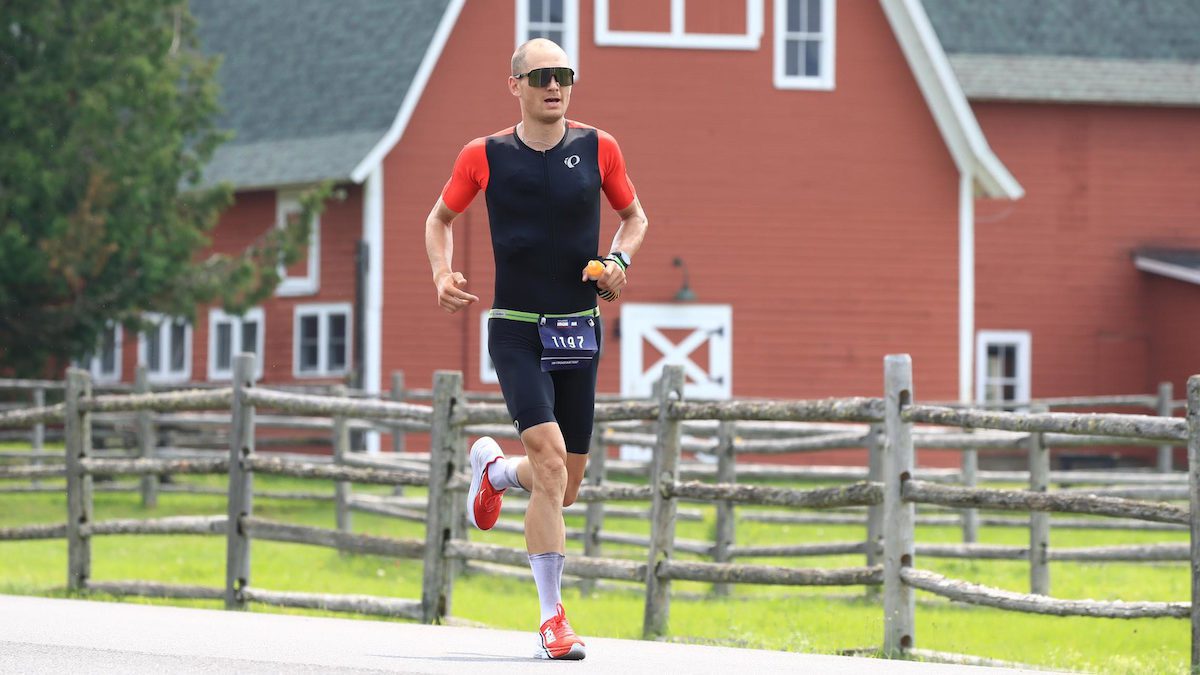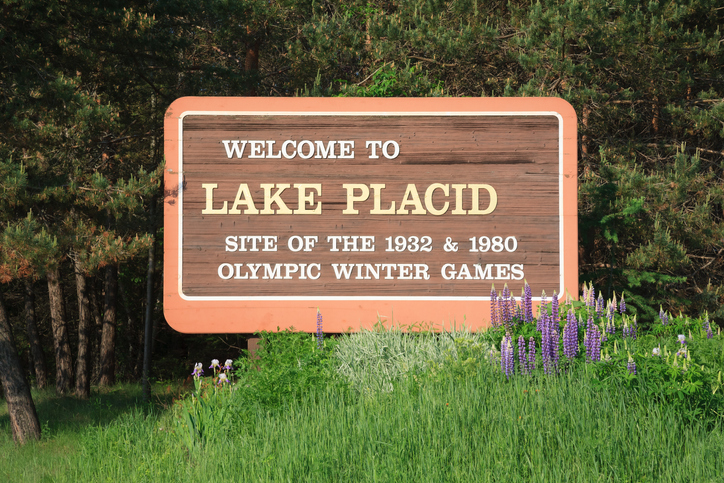How 8 minutes in the US led to a 2-week quarantine for this Canadian age-grouper
From 2 weeks in quarantine to qualifying for the Ironman World Championship
 Photo by:
FinsiherPix
Photo by:
FinsiherPix
The day began innocently enough. Simon Leblanc had a 100-kilometre training ride to tick off, so he pedalled south from his home in Saint-Prosper, Que., toward the Canada-U.S. border, 50 km away. Leblanc planned to kill two birds with one stone: he would stop at the border crossing at Jackman, Maine, and ask the American agent on duty what documents he’d have to provide and what would be the best port of entry to take when he headed down to race Ironman Lake Placid a couple of weeks later. His questions answered, Leblanc turned around to bike home. But, when he stopped at the Canadian border security window a few metres away, he got a rude surprise. Instead of waving him through, the agent asked a few questions, told him to wait a moment and returned with two boxes containing COVID testing kits, informing Leblanc he was now under quarantine for 14 days.
“I was like, ‘Whoa, hold on for a second! I haven’t crossed the border. I’m on my bike. I just went to the U.S. border to get some information,’” said Leblanc. “I was there for five minutes.”
In fact, the agent told him, he’d checked the security camera, and it had been eight minutes. No matter. Leblanc had not realized the moment he biked past Canadian customs, he had indeed crossed the invisible line into the U.S. Returning to Canada moments later, the same land crossing rules applied to him as to any Canadian snowbird who’d spent the winter in Florida.
Leblanc was devastated. Just three weeks earlier, on June 21, he’d learned that Ironman Mont-Tremblant, his 2021 A-race — indeed, the only race on his roster this past season — had been cancelled due to COVID restrictions. Ironman offered free transfers to another race, so with only five weeks to go before the Lake Placid competition, the 30-year-old triathlete and his friend and coach, Elliot-Olivier Pellerin, decided to throw caution to the wind and risk cutting a month of training. Lake Placid is only a few hours from Leblanc’s hometown in the Beauce region, and it was Leblanc’s best shot at repeating his 2019 victory at Mont Tremblant, where he won the 25 to 29 age group category and a Kona qualification. Now 14 days of enforced quarantine would throw a wrench into an already-compressed race preparation plan.
“Anyone who trains for Ironman, it can be as difficult as training for the Olympics,” said Leblanc.
“I was like, ‘I want to go back to Kona. I want to be a world champion.’”
“I had two weeks to go before the race. No matter what, I was training.”
Holed up at his parents’ house, Simon Leblanc took turns with his father, calling every politician and government official they could think of. It took days, but eventually a Quebec public health official told Simon they would put a note in his file: he could keep training outdoors, alone, but he could not go to work at Joe Bicycle, the shop in Saint-Georges he owns with his partner, Mathieu Robichaud, nor leave the house for any other reason.
Another problem loomed: his quarantine period was due to end July 25, the very day of the Lake Placid race. “I called everyone on Planet Earth,” Leblanc says. Eventually, he found a sympathetic ear at Canadian Border Services. An agent told him there was nothing to stop him from driving to the U.S., despite the quarantine order. It didn’t apply south of the border. So, on July 20, he took his chances, collected his passport, his proof of vaccination and every document he could get his hands on, and headed for the border crossing at Champlain, NY.
“All the way, I was rehearsing what I’d say at the interview,” he says. “They asked me everything. Why was I training? Who were my sponsors? I said, ‘I don’t have many sponsors, but this is my only chance to race this year, to get back to Kona, to inspire people in my region.’”
He figures he was grilled for at least half an hour. He showed them the pro licence he’d taken out for the 2020 season but never had a chance to use. Eventually, they told him he was good to go.
“I called Elliot and said, ‘I’m on my way to Lake Placid!’ We were very stoked.”

Leblanc had driven through Lake Placid once, on the drive back to Saint-Prosper from Chattanooga, but he had never scouted the course. More than that, this was to be his first triathlon equipped with a power meter, or for that matter, any device to feed him data.
“He basically had this Mickey Mouse watch,” said Pellerin, who came in three minutes behind Leblanc at Ironman 70.3 Mont-Tremblant in 2019. The two of them met in the finishers’ tent there and raced against each other again at the full-distance event later that summer, where they both qualified for the 2019 world championship.
“He had an amazing race at Kona,” said Pellerin. Leblanc nailed it, finishing seventh in the 20 to 29 age group in 9:10:02, more than 11 minutes faster than his result at Mont-Tremblant.
Leblanc recalls meeting a group of fellow Quebecers after that race at the champions’ dinner and watching them as they scrolled through their cell phones, comparing data. “They were like, ‘Show us how you did on the power meter?’ I said, ‘Wow, guys, I don’t even have a watch.’”
In fact, he did have a watch with a built-in stopwatch. When the gun went off in Kailua Bay, Leblanc pressed start, and when he crossed the finish line on Ali’i Drive, he hit stop. When his fellow Quebec age-groupers heard this, noting that Leblanc was the third Canadian to finish the race, behind pro Lionel Sanders and North Vancouver’s Dylan Gleeson, they ganged up on him and told him to get ambitious — and get a coach.
Surviving COVID – Saskatoon triathlete goes from peak shape to barely breathing
Pellerin said he didn’t take much convincing.
“He caught the triathlon bug and was enjoying every moment of it. He had the drive of a champion.”
Leblanc demonstrated that at Lake Placid, placing 14th in 9:04:38 — the fastest time of any age-group athlete. That’s despite his new power meter conking out 17 km into the bike leg. But his friend-turned-coach had broken down the bike course for him, and he knew it by heart.
“I knew where to push, where to hold back, what to do, what not to do. So I said, OK, forget about the data. I’ll just bike the course the way Elliot wants the course to be done.”
He knew he was doing well when he got to the transition area and couldn’t see any other bikes, until he spotted an athlete who had beaten him in 2019.
“I knew he was good. So I just did what Elliot had told me: Simon, rack your bike and run for your life!”
“Simon is a warrior,” says Pellerin, who calls his side business as a coach EOP, both a play on his initials and his motto, Excellence in Optimization of Performance. He has a small stable of athletes who all buy into his dictum, “no regrets at the finish line,” but he has never had a triathlete with Leblanc’s potential. “He has a crazy mindset. I queued him on certain things to think about, and he executed the race perfectly.”
It was a happy ending – but a short-lived one, with news first of Kona’s postponement till February, then the move to St. George, Utah, in May. Leblanc is taking it in stride.
“I’m just going to stay here on Cloud Nine for a few more weeks,” he said. “I’m pretty sure we will be racing Kona eventually. When, I don’t know.”
“I’ll keep on training, and I’m just going to be really, really ready.”
This story originally appeared in the Nov./ Dec. issue of Triathlon Magazine Canada.
